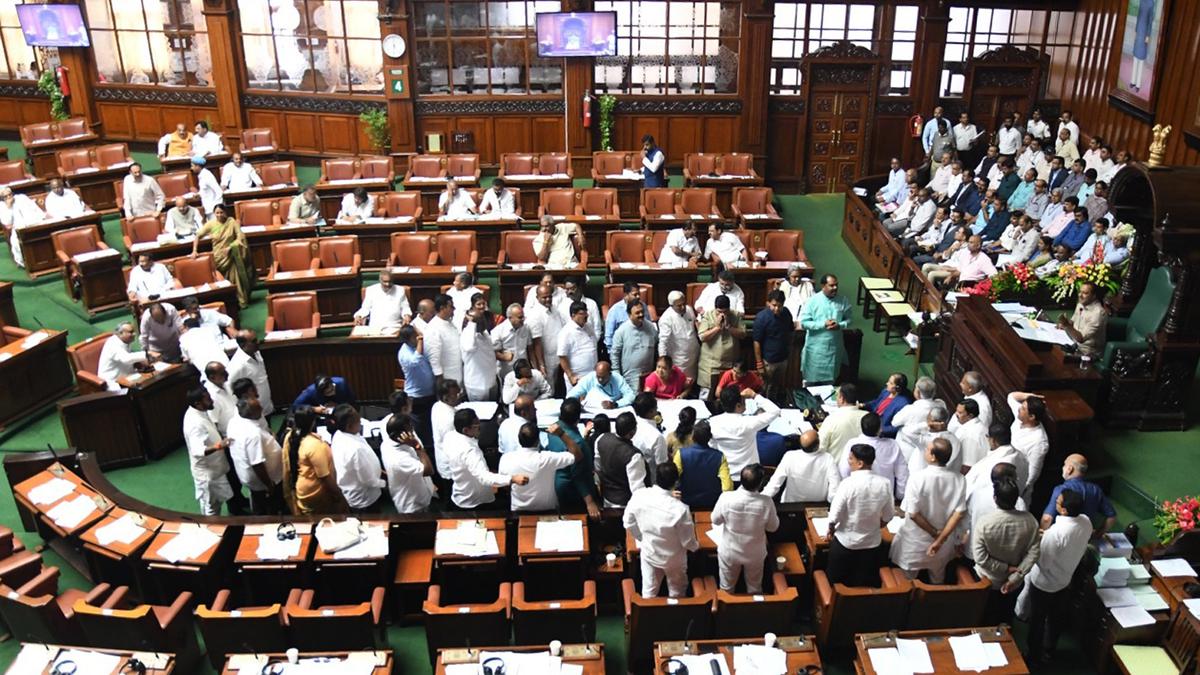
Here are the big stories from Karnataka today
The Hindu
Karnataka Today newsletter: Legislative Assembly plunges into pandemonium, and more
The Karnataka Legislative Assembly descended into pandemonium on day 2 of the Budget session after members of the Opposition BJP staged a dharna in the well of the House. The trouble began when Speaker U.T. Khader did not allow former Chief Minister Basavaraj Bommai to move an adjournment motion seeking a debate on non-implementation of five guarantees by the Congress government.
When the Speaker turned down Mr. Bommai’s demand, BJP leaders erupted in protest, alleging that the Congress government led by Chief Minister Siddaramaiah had “deceived” the people of the State. As both the Congress and BJP members indulged in sloganeering, the Speaker adjourned the House for 15 minutes.
The ongoing budget session has also been extended by five more days, until July 21. A decision to this effect was taken at the Business Advisory Committee meeting of the House.
The Bruhat Bengaluru Mahanagara Palike (BBMP) has failed to collect over ₹50 crore from advertising agencies who have been provided space on skywalks in the city. Nine agencies bagged tenders from the civic body for construction of pedestrian overbridges and to rent space on the same. The companies are expected to pay ground rent, advertisement fee, tax and other payments, including GST, to the BBMP.
However, documents accessed by The Hindu show that the BBMP has issued 36 demand notices seeking payment of dues from the companies. While the total pending dues is pegged at over ₹26 crore, the amount crosses ₹50 crore with 18% penalty.
Dakshina Kannada Deputy Commissioner M. P. Mullai Muhilan on July 4 declared a holiday for education institutions in Mangaluru sub-division following heavy rains. Schools and colleges in Mangaluru, Mulki, Bantwal, Ullal and Moodbidri taluks remained closed.
According to the Karnataka State Natural Disaster Monitoring Centre (KSNDMC), Pajiru in Bantwal taluk of Dakshina Kannada recorded the highest rainfall of 172.5 mm in 24 hours ending at 8.30 a.m. on July 4.

“Writing, in general, is a very solitary process,” says Yauvanika Chopra, Associate Director at The New India Foundation (NIF), which, earlier this year, announced the 12th edition of its NIF Book Fellowships for research and scholarship about Indian history after Independence. While authors, in general, are built for it, it can still get very lonely, says Chopra, pointing out that the fellowship’s community support is as valuable as the monetary benefits it offers. “There is a solid community of NIF fellows, trustees, language experts, jury members, all of whom are incredibly competent,” she says. “They really help make authors feel supported from manuscript to publication, so you never feel like you’re struggling through isolation.”

Several principals of government and private schools in Delhi on Tuesday said the Directorate of Education (DoE) circular from a day earlier, directing schools to conduct classes in ‘hybrid’ mode, had caused confusion regarding day-to-day operations as they did not know how many students would return to school from Wednesday and how would teachers instruct in two modes — online and in person — at once. The DoE circular on Monday had also stated that the option to “exercise online mode of education, wherever available, shall vest with the students and their guardians”. Several schoolteachers also expressed confusion regarding the DoE order. A government schoolteacher said he was unsure of how to cope with the resumption of physical classes, given that the order directing government offices to ensure that 50% of the employees work from home is still in place. On Monday, the Commission for Air Quality Management in the National Capital Region and Adjoining Areas (CAQM) had, on the orders of the Supreme Court, directed schools in Delhi-NCR to shift classes to the hybrid mode, following which the DoE had issued the circular. The court had urged the Centre’s pollution watchdog to consider restarting physical classes due to many students missing out on the mid-day meals and lacking the necessary means to attend classes online. The CAQM had, on November 20, asked schools in Delhi-NCR to shift to the online mode of teaching.









